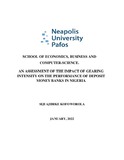| dc.description.abstract | Capital structure plays a key role in the financial stability of the banking sector. To this end, gearing, which is the ratio of debt to equity is often given consideration when structuring the capital base of Deposit Money Banks (DMBs). Debate over the years have been inconclusive thereby putting policy makers on a crossroad. More so, previous studies on gearing have not only concentrated on time series approach to evaluate gearing within the context of non–financial institutions, they also neglected the individual effect of gearing on accounting variables in their panel data set. This study, therefore, examined the impact of gearing intensity on the financial performance of deposit money banks in Nigeria. The objectives were to: investigate the effect of gearing on the operating performance of DMBs; assess the impact of gearing on accounting performance of DMBs and investigate the effect of gearing on the efficiency of DMBs in Nigeria.
The study anchored on the static trade-off theory of capital structure. Data were collected from seven deposit money banks that includes Access Bank, Eco Bank, Fidelity Banks, Stanbic IBTC, United Bank for Africa, Union Bank and Zenith Bank for the period 2011 to 2020. The variables used in the study were gearing intensity, return on asset, return on capital employed, gross profit, non-performing loans, and net interest income obtained from the annual audited financial statements of 7 Deposit Money Banks. The data was analyzed using descriptive analysis, panel regression and multiple regression analysis.
Analysis of results from the panel regression revealed gearing to be negatively related to gross profit, return on asset and return on capital employed. As regard individual specific result, a positive relationship was also found to exist between gearing intensity and gross profit in Eco, Zenith and Fidelity banks, while gearing intensity was found to be negatively related to gross profit in Access, United Bank for Africa, Union Bank and Stanbic IBTC.
The study concludes that gearing is negatively related to operating performance and efficiency in deposit money banks in Nigeria. The study recommends that financial institutions that seek external debt should look for low-interest loans such that the tax benefits of the loan outweigh the financial hardship. Also, banks should ensure that they do not rely on long term loan but try to ensure they have readily capital in financing and given aid to their customers. | en_UK |

